#Nizam al Mulk
Text
From Ferdowsi to the Seljuk Turks, Nizam al Mulk, Nizami Ganjavi, Jalal ad-Din Rumi & Haji Bektash
By Prof. Muhammet Şemsettin Gözübüyükoğlu (Muhammad Shamsaddin Megalommatis)
Pre-publication of chapter XXIII of my forthcoming book “Turkey is Iran and Iran is Turkey – 2500 Years of indivisible Turanian – Iranian Civilization distorted and estranged by Anglo-French Orientalists”; chapter XXIII constitutes the Part Nine (Fallacies about the Golden Era of the Islamic Civilization). The book is made of 12 parts and 33 chapters.
----------------------------------------------------
Read and download the chapter here:
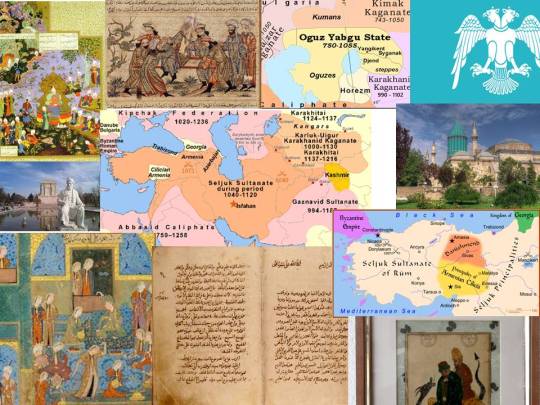
#Ferdowsi#Seljuk Turks#Seljuk#Seljuq#Nizam al Mulk#Nizami Ganjavi#Jalal ad-Din Rumi#Haji Bektash#Gözübüyükoğlu#Shamsaddin Megalommatis#Megalommatis#Orientalism#Iranology#Turkology#Iranian Studies#Anatolia#History of Islamic Anatolia#Islamic Iran#Islamic Studies#Islamology#Tus#Khorasan#Shahnameh#Messianism#Eschatology#Soteriology#Muhammad ibn al-Askari#Twelfth Imam#Islam#Sunni
3 notes
·
View notes
Text
Al-Ghazali è considerato uno dei più importanti e profondi pensatori islamici di tutti i tempi.
La profondità, la potenza e la completezza del suo pensiero, contenute in una cinquantina di opere diverse, le più importanti delle quali sono Ihya 'Ulum ad-Din, Tahafut al-Falasifa e al-Munqidh min al-Dalal, sono studiate ancora oggi.
Ihya Ulum al-Din (o La rinascita delle scienze religiose) è probabilmente l'opera più importante e influente di al-Ghazali. Il libro è diviso in quattro parti, ognuna delle quali contiene dieci capitoli e tratta della conoscenza e dei requisiti della fede - purezza rituale, preghiera, carità, digiuno, pellegrinaggio, recitazione del Corano e altri principi e pratiche dell'Islam.
Inoltre, conciliò la shari'a e il misticismo sufi (i fuqaha' e i sufi) e contribuì alla diffusione delle confraternite sufi. Per il suo grande contributo alle scienze islamiche, è stato ampiamente considerato come il mujaddid (il rivivificatore o il riformatore islamico) della sua epoca.
Riconosciuto da Nizam al-Mulk, il vizir dei sultani selgiuchidi, nel 1091 fu nominato direttore del Collegio Nizamiyyah di Baghdad. Qui tenne lezioni di giurisprudenza islamica, confutò le eresie e rispose alle domande di tutti i segmenti della comunità.
Molti (come Neil deGrasse Tyson) ritengono che al-Ghazali abbia distrutto da solo l'età dell'oro islamica. Ma al-Ghazali scrive in Munkidh min al-Dalal (Liberazione dall'errore):
"È davvero un grande crimine contro la religione quello commesso da chiunque supponga che l'Islam debba essere difeso dalla negazione di queste scienze matematiche".
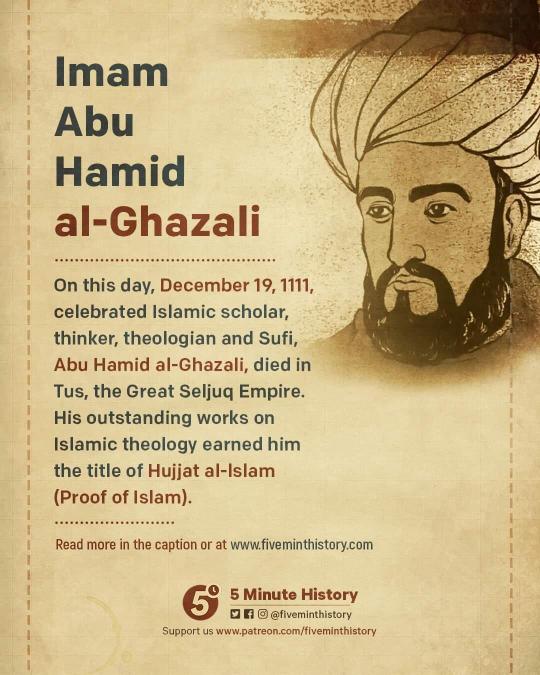
17 notes
·
View notes
Text

#BelajarJadiUmma: Bayi Yusha Sudah Tujuh Bulan!
Mengingat beratnya di bulan awal membersamai Yusha rasanya hari ini bersyukur sekali bisa menjalani hari dengan lebih ‘normal’ dan menyenangkan.
Sakit-sakit menyusui di bulan pertama, sedih-sedih harus memberikan susu formula di bulan kedua, susah-susah relaktasi di bulan ketiga, harap-cemas saat mulai kembali ASI penuh di bulan ke empat, tenang-menerima drama berat badan di bulan kelima, hingga antusias membersami Yusha yang banyak berkembang di bulan ke enam lengkap dengan deg-degan MPASI yang baru saja dimulai.
—
Setiap umma memang punya ceritanya sendiri, tapi yakinlah di sana juga rahmat-Nya terlimpah tanpa terkecuali. Bukan hanya dari mudahnya, bukan dari bebas dari sulitnya, sebab di setiap inchi kejadian, tempat, waktu dan benda, rahmat-Nya lah yang kita cari. Semoga kita bisa menjadi seorang muttaqi, seorang yang dapat merasakan rahmat Allah dalam segala sesuatu di hidup ini.
—
Terakhir, mohon titip do’a semoga aku dan suami ke depan semakin baik dalam menjalankan amanah membersami Yusha hingga kelak ia menjadi pemimpin yang taat seperti Yusya’ bin Nuun, menjadi ahlul ilmu yang berkontribusi untuk ummat sepeti Nizam Al-Mulk, serta menjadi Muzakka, manusia yang jiwanya disucikan Allah senantiasa. Aamiin ya Rabbalalamin.
Do’a terbaik juga untuk teman-teman semua :)
—
Ardina. Bandung, 21 Maret 2024. Sambil menyusui Yusha dalam pangkuan :’)
1 note
·
View note
Text
Sneaky ninja tactics to employ

#SNEAKY NINJA TACTICS TO EMPLOY SERIES#
They were widely feared at the time and certainly seemed to live up to their name.Īncient assassins known as Thuggees worked as a team. The Thuggees have been called the world’s first Mafia and it is believed they were responsible for around 2000,000 deaths. Rather than working alone as many ancient assassins did, Thuggees attacked as a group with each member of the gang playing a different role such as look-out. A cult of ancient assassins called the Thuggees (which is Sanskrit for ‘concealment’) were a gang of assassins operating in India between the 13th and 19th Centuries. ( Frédéric Prochasson / Adobe) 3.They Could be ThugsĪncient assassins could be thugs - it’s actually where the word ‘thug’ originates. Ninja women call the kunoichi were particularly formidable ancient assassins. After they had gained access to their target, they dispatched them just as ruthlessly as their male counterparts and had no qualms utilizing the famed throwing stars and katanas we associate with ninjas today. The kunoichi liked to take advantage of the fact people generally regarded women as harmless housewives, and they were able to get far closer to their targets to either gather information or kill them because the men did not anticipate this. However, in the world of assassins, women should not be forgotten, and a special order of ninjas called kunoichi were particularly formidable assassins. Warfare has traditionally been left to men and as a result most great warriors and generals have been men. Espionage was something that other groups would often refuse to do, for example samurais felt that espionage was beneath them which meant people would hire ninjas instead. Their ability to stay hidden and undetected also made them perfect candidates to conduct espionage and assassins were sometimes hired with the sole intention of spying on and not killing or harming a target. It is often considered their most significant assassination. He was wise enough to heed the warning and did as they had instructed.ġ4th-century painting of the successful assassination of Nizam al-Mulk, vizier of the Seljuq Empire, by an ancient assassin from the Hashashins. The notorious Muslim leader Saladin allegedly received one of these threatening Hashashin notes pinned to his table with a poisoned dagger as he slept, along with a tray of Hashashin scones. The Hashashins, a group of assassins formed in Persia and Syria, were so feared that when they left a warning note and a calling card, such as scones made in the characteristic Hashashin way, it was often enough to persuade someone to do what they were told The word ‘assassinate’ today means to kill an important figure for political reasons, but the assassins of the past did not always resort to killing to get their point across. From secret codes to secret weapons, these are ten facts about assassins you may not have heard before. The truth behind these ancient groups of assassins is often clouded in mystery – their activities were clandestine and discussing their work was often considered taboo – but the surviving information about assassins provides some fascinating information about the roles they played in ancient society and the tactics they were willing to employ. The games are known for their historical accuracy and while the society itself may be fictional, there really were assassins in most, if not all, of the ancient civilizations we are familiar with today.
#SNEAKY NINJA TACTICS TO EMPLOY SERIES#
The game series Assassin’s Creed is a wildly successful franchise following a secret order of assassins who have existed for thousands of years.

0 notes
Text
Can't wait to stab Nizam al-Mulk in the dick and say "this is for stealing credit for the boss's accounting in the 70s!"
0 notes
Text
I don't know the authenticity of this, but while reading the writings of Nizam al Mulk to the Sultan, I came across an interesting story about the power of generosity.
Nizam al Mulk told the story of Pharaoh and Musa عليه السلام, saying that while Musa would call upon Allah to destroy the arrogant Pharaoh, years passed and there was no change. So Musa went to Allah to ask about this and Allah told him that there were thousands who would pray for Pharaoh's longevity due to his generosity over them. Pharaoh would set out daily banquets for the public, complete with such and such sheep, cows, camels, chickens, fish, milk, sweets and more. So long as he provides abundant food and comfort for My creatures, I shall not destroy him.
Musa then asked: so when will Your promise be fulfilled?
Allah said: once Pharaoh withholds his provisions from the people, know that his end is near.
And sure enough, years would pass and unease grew in the Pharoah's court, until Pharaoh told Haman: Musa and the sons of Israel are causing trouble and we do not know how this will end. We must keep our reserves full lest there be a time where we will be without resources. Gradually, the rations he set out to the people began to decrease, and it is said that on the day Pharaoh drowned, there were only 2 sheep that left the royal kitchen.
As the Prophet Muhammad عليه الصلاة والسلام said: "The believer's shade on the Day if Resurrection will be their charity." Sadaqah is also known to protect against calamities and increases one's sustenance and blessings.
And nothing you do for the sake of Allah is forgotten. It is all carefully recorded. You will see the benefits of every sadaqah (whether it's a few dollars, a meal you prepared for your family, a word of advice to your brother, or even a smile) in the dunya and akhirah inshaAllah 💫
— @dearallah on instagram
#islam#muslims#allah#quran#deen#islamic reminders#muhammad#sadaqah#nizam al mulk#musa#islamic history
18 notes
·
View notes
Text
سلطان محمد الپ ارسلان : ایک متقی اور پرہیز گار حکمران
الپ ارسلان نے اپنے چچا طغرل بیگ کی وفات کے بعد زمام اقتدار اپنے ہاتھ میں لی۔ اگرچہ اقتدار کی خاطر ملک میں کچھ جھگڑے ہوئے لیکن الپ ارسلان نے ان تنازعات پر بروقت قابو پا کر حالات کو اپنی گرفت میں لے لیا۔ الپ ارسلان اپنے مرحوم چچا طغرل بیگ کی طرح ایک نہایت مدبر، تجربہ کار لیڈر اور جرأت مند شخصیت کا مالک مخلص قائد تھا۔ اس نے ملکی سرحدوں کو وسیع کرنے کے لیے ایک نہایت ہی دانشمندانہ پالیسی اختیار کی، جو علاقے سلجوقی سلطنت کے زیرنگیں تھے، پہلے ان کے استحکام کو یقینی بنایا اور اس کے بعد بیرونی دنیا کی طرف پیش قدمی کی۔ سلطان الپ ارسلان جہاد فی سبیل اللہ اور اپنی پڑوسی مسیحی سلطنتوں میں اسلام کی اشاعت کے لیے بے قرار رہتا تھا۔ اس کی ہمیشہ سے یہ کوشش رہی کہ ارمن اور روم کے علاقے اسلامی قلم رو میں شامل ہوں۔
الپ ارسلان اپنی مملکت کی سرحدوں کو وسیع کرنے سے پہلے سات سال کے عرصہ تک اپنی مملکت کے دور دراز علاقوں کے حالات کا جائزہ لیتا رہا اور جب ان علاقوں میں امن و امان کی صورت حال سے مطمئن ہو گیا تو اپنے عظیم مقاصد کو پائے تکمیل تک پہنچانے کے لیے پلاننگ شروع کر دی۔ ان کے سامنے اب ایک ہی ہدف تھا۔ سلجوقی سلطنت کے پڑوس میں واقع مسیحی علاقوں کو فتح کرنا، فاطمی دولت کے اقتدار کو ختم کرنا اور تمام اسلامی دنیا کو عباسی خلفا اور سلجوقی اقتدار کے جھنڈے کے نیچے متحد کرنا۔ الپ ارسلان نے اپنے منصوبے کو عملی جامہ پہنانے کے لیے ایک بہت بڑا لشکر تیار کیا اور اس لشکر کی قیادت کرتا ہوا ارمن اور جارجیا کی طرف روانہ ہوا۔ یہ علاقے بہت جلد ان کے ہاتھوں فتح ہوئے۔
الپ ارسلان آگے بڑھا اور شام کے شمالی علاقے پر یورش کی، حلب میں مرداسی حاکم تھا۔ اس سلطنت کی بنیاد 1023ء میں صالح بن مرداس نے رکھی۔ الپ ارسلان نے مرداسی سلطنت کا محاصرہ کر لیا اور اس سلطنت کے فرمانروا محمود بن صالح بن مرداس کو مجبور کیا کہ وہ مصر کے فاطمی خلیفہ کی بجائے عباسی خلیفہ کی حکومت کو تسلیم کرے اور لوگوں کو اس حکومت کے احکامات کا پابند کرے۔ اس کے بعد الپ ارسلان نے ایک ترکی نژاد قائد اتنسزبن اوق خوارزمی کو جنوبی شام پر حملہ کرنے کے لیے بھیجا، خوارزمی نے فاطمیوں سے رملہ اور بیت المقدس چھین لیے لیکن عسقلان پر قبضہ نہ ہو سکا جسے مصری حدود میں داخلہ کے لیے ایک بہت بڑے دروازے کی حیثیت حاصل تھی۔ الپ ارسلان کی فتوحات نے رومی شہنشاہ ڈومانوس ڈیوجیس کو آتش زیرِپا کر دیا اور اس نے پختہ ارادہ کر لیا کہ وہ ہر قیمت پر اپنی شہنشاہیت کا دفاع کرے گا۔ سو اس مقصد کی خاطر اس نے اپنی پوری فوج سلجوقیوں کے خلاف جنگ میں جھونک دی۔
رومی اور سلجوقی فوجوں میں کئی خونریز معرکے ہوئے۔ ’’ملاذکرد‘‘ کا معرکہ ان سب میں زیادہ اہم ہے جو اگست 1070ء کو برپا ہوا۔ ابن کثیر لکھتے ہیں ’’اور اس معرکے میں روم کا بادشاہ ڈومانوس پہاڑ کی مانند لشکروں کو لے کر روانہ ہوا۔ ان لشکروں میں روم، روس، برطانیہ اور کئی دوسرے ملکوں کے سپاہی شریک تھے۔ ڈومانوس کی جنگی تیاریاں بھی خوب تھیں۔‘‘ الپ ارسلان کا ایک مختصر سے لشکر، جس کی تعداد 15 ہزار سے زیادہ نہیں تھی، کی مدد سے شہنشاہ روم ڈومانوس کے ایک لاکھ سپاہیوں پر مشتمل بہت بڑے لشکر کو شکست فاش سے دوچار کرنا کوئی معمولی واقعہ نہیں تھا۔ اس واقعہ نے رومیوں کی کمر توڑ دی۔ الپ ارسلان ایک متقی اور پرہیز گار انسان تھا۔ فتح مادی اور معنوی ہر دو اسباب سے استفادہ کرتا تھا۔ اسلام کا یہ طبل جلیل اور عظیم سپہ سالار ایک باغی کے ہاتھوں شہید ہوا۔ اس باغی کا نام یوسف خوارزمی تھا۔ آپ کا سن وصال 1072ء ہے۔ آپ مرو کے شہر میں اپنے باپ کے پہلو میں دفن ہوئے اور ملک شاہ کو اپنے پیچھے جانشین چھوڑا۔
علی محمد الصلابی
0 notes
Photo



Mehmet Özgür est Nizam al-Mulk dans Uyanış: Büyük Selçuklu.
#Mehmet Özgür#Mehmet Özgür avatars#avatars#uyanış: büyük selçuklu#period fc#userperioddrama#perioddramaedit#periodedit#fc help#fcressources#weloveperioddrama
4 notes
·
View notes
Text
WHO WAS NIZAM AL MULK - NİZAM-İ ALEM
Abu Ali Hasan Ibn Ali Tusi tareekh me apne bahtareen rutbe nizam ul mulk se behtar jaane jaate hain.
aapne seljuk saltanat ke doosre sultan, sultan alp arslan aur unke bete malik ul aadil sultan melik shah ke liye apni khidmaat pesh ki thi.
Nizam Ul Mulk ki paydaish 10 april 1018 isvi ko iran ke tous / tus shahar ke qareeb ek ganv radkan me hui thi. aapke valid ali ibn ishaak ek ghaznavi malyati afsar the.
1040 me jab jange dandanaqan me seljukon ne ghaznaviyon ko shikast dekar khurasaan fatah kiya tha tab abu ali hasan ibn ali tusi ke valid ali ibn ishaak ghazni hizrat kar gaye the.
1 note
·
View note
Text
Hashshashiyah, the 'Assassin' master's assassins.
.
The behavior of these assassins is the same as in the movies in the game we know. There was no face-to-face collision, but quietly sneaking behind him, leaving no clue. There is planning and not choosing a method to accomplish the mission.
.
It is said that the very internet-looking 'Assassin' term may have originated from religion, a group of people, world war, western Asia. But how?
.
All of their starting points came from the Shia side. One of the Islamic denominations This Shia sect also had a few more branching groups. This time, we are specific to the group. The Hassan-i Sabbah, the Hassan-i Sabbah, was considered the first Nisari during the Selju Emperor era. C During the crusade
.
Hassan Isabbah was considered a highly educated man. And has expertise in many fields At the end of the 11th century, Hassan had an ideology of wanting to strengthen the Ismaeliyah and expand the territory. Therefore presented this idea to the leader of the Ismaeliyah group But the group leader did not agree. Hassan himself decided to separate the group with little manpower.
.
After the persuasion of intimidation Hassan quickly formed a group and settled in Alamut Mountain, south of the Caspian Sea. Iran Then formed a private follower group on behalf of 'Hashshashiyah' or Hashshashins.
.
Hashsha Shiyah Group Received intensive training similar to special forces Master the best in assassination and terrorizing the enemy. They are set up by Hassan to undertake covert missions, many of which involve political interests. And do not choose a method
.
The first and most known mission was to kill Seljuk's great Persian noble Nizam al-Mulk in 1092 by disguising himself as a Sufi mage. 1131-1135, a Sunni Caliph named Mustarshid was also killed by the Hashshashiyah.
.
And they are planning to disguise themselves as Christians to kill the nobles. 'Conrad of Montferrat', one of the leaders of the Third Crusade. As he wandered the courtyard of Tire with the knights as well.
.
It is also famous for 'The use of psychological warfare' is to instill fear that the enemy surrenders without risking their lives, for example, Saladin, the Sultan of Egypt. Who had awoken and found a poisoned knife with a message from Hashshashiyah that he would kill him if he did not withdraw Which made him so much displeased that he agreed to peace with Hashshashiyah
.
Throughout the time Hassan formed the Hash Shaqiyah Starting in the year 1090, they have killed two Caliphs. Including many nobles and crusader leaders
.
With this brutal decisive action, the legend of the Hashshashiyah spread over the centuries to Eurasia and North Africa. The narratives are a blend of factual records and historical interpretations. Until it becomes as complicated as fiction
.
But then there was one mission that kept Hashshashiyah shut up forever: the killing of Genghis Khan's son-in-law 'Möngke Khan'. This mission sparked the Mongols to strike a stronghold like Alamut Castle in 1256 on November 19. It was the end of the legend completely.
.
However, some groups continued to record that The Hashshashiyah spent several months. Alamut was able to return to the year 1275 successfully, but was eventually destroyed by the Mongols, destroying everything as before.
.
The clearing of the Alamut Strongholds prompted the story of Hashshashiyah. No exact historical data is written. Some records say that he was a Nisari rebel. Most of the word of mouth only contains information about the brutal heroism he has caused, along with the negative reviews that have been recorded. It is said that it is because the person who says it all is an enemy. Or the one who fears him
.
Like Marco Polo, he speaks of Hassan in a very pessimistic manner. He said Hassan had poisoned his companions with marijuana and led them to 'Heaven' when his followers recovered. Hassan would claim that he was the only one who had the means to allow them to return to 'Heaven', so his followers devoted complete loyalty to Hassan and did whatever he wanted.
.
The term Assassin has an unusual origin, not from the usual roots. It is largely assumed to be from the Hashshashiyah or Hashashine, but with a foreign accent it becomes 'assasin' and is defined as 'killer' in English.
.
Some said it was used to name a group that had an idea. Faith and goals that one thinks is sacred And killing one or more important people in society Like the Ismaeliah group Or Hashshashiyah, who uses the means of martyrdom to drive his own goals.
.
For those who share the same cause, Hashshashiyah's actions are regarded as heroes. But for those who had been assassinated, he would not have thought so.
__________________
By admin wa
Thanks to information from
https://bit.ly/2QQXf8q
https://th.wikipedia.org/wiki/ Ismaeliyah
https://th.wikipedia.org/wiki/ Assassin
https://bit.ly/3dgggZo
https://www.blockdit.com/posts/5d0c66f80984e11015b9e576
https://1th.me/71YpY
https://www.thoughtco.com/history-of-the-assassins-hashshashin-195545
#Hashshashins #Assassins #History #TheMemoLife
2 notes
·
View notes
Text
On this day (4 December, 1131 CE / 4/5 Muharram 526 AH), the famous Persian mathematician, astronomer, philosopher and poet, Abu’l Fath Omar ibn Ibrahim al-Khayyam or more simply known as Omar Khayyam, passed away in Nishapur, modern-day Iran at the age of 83.
After the Seljuk dynasty had expanded into Karakhanid domains (parts of Central Asia) in the 11th century (CE) under Sultan Malik-Shah I (son of Sultan Alp Arslan), Omar Khayyam entered into the service of the Seljuks.
He was personally invited by the Seljuk Vizier Nizam al-Mulk to meet Sultan Malik-Shah I and was thereafter requested to set up an observatory in the Seljuk capital of Isfahan (modern-day Iran).
It is said that in this very observatory, Omar Khayyam calculated the length of the solar year to be 365.242199 days; modern science has determined he was off by just 0.74 seconds.
He is also currently being depicted in the new Turkish TV series on the Great Seljuks titled "Uyaniş: Büyük Selçuklu" or "Awakening: The Great Seljuks".
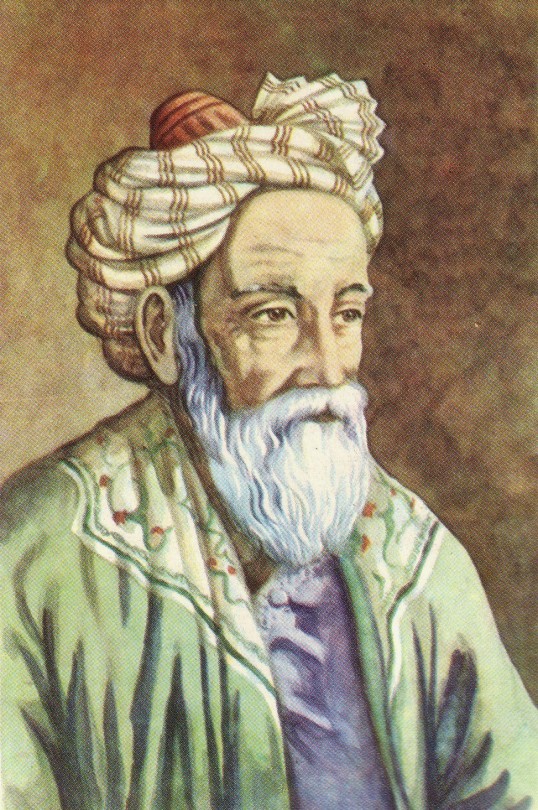
6 notes
·
View notes
Text
Back To Tarbiyah
Pada dasarnya, tarbiyah merupakan sebuah proses pencarian jati diri melalui penempaan dengan internalisasi nilai-nilai kebaikan terhadap manusia. Dilakukan dengan totalitas perhatian dan usaha, mengajak manusia dari jalan kesesatan menuju jalan terang benderang.
Selanjutnya dengan memahamkan bahwa hal yang ada di dunia ini adalah fana, dan kenikmatan yang ada di dunia ini adalah nikmat taqwa kepada Allah serta mendapatkan keselamatan dunia dan akhirat.
Dalam menopang agenda dakwah kampus, proses tarbiyah menjadi penting untuk membentuk orang-orang yang akan meneruskan estafet dakwah. Dimulai dengan membangun pemahaman yang konstuktif, perekatan ukhuwah antar kader, hingga pengkaryaan yang sesuai dengan kemampuan kader. Proses tersebutlah yang akan membentuk keteraturan dalam barisan dakwah.
Seperti apa yang dilakukan Rasulullah shalallahu alaihi wassalam dalam fase-fase dakwah, yang paling utama dan perlu mendapatkan perhatian adalah agenda tarbiyah, karena hal inilah yang menjadi esensi kenapa dakwah hadir. Rasulullah diutus di dunia tidak lain dan tidak bukan adalah untuk memperbaiki akhlak manusia.
Bahkan dapat diberikan perumpaan dalam masa kejayaan kita, "Bahkan ketika kelah Khilafah Islamiyah berdiri dengan tegak, proses tarbiyah merupakan hal yang tidak bisa ditinggalkan "
Kita ambil contoh pada pemerintahan Kesultanan Turki Seljuk. Kesultanan ini merupakan salah satu negara yang mengabdikan dirinya kepada Kekhalifahan Abbasiyah di Baghdad. Pada masa ini pula Umat Islam mulai diserang berbagai pemikiran sesat seperti Mu’tazilah, Syiah, maupun Batiniyah Rafidhah. Gerakan-gerakan ini lah yang senantiasa mengancam pemerintahan Islam baik dari segi pemahaman Islam di tengah masyarakat dan pejabat-pejabat publik yang ada di pemerintahan.
Salah satu perdana menteri bernama Nizam Al-Mulk menginisiasi sebuah madrasah yang kelak akan menghadirkan generasi Islam yang tangguh, Madrasah Nidzamiyah. Yang kelak ketika lemahnya pemerintahan Turki Seljuk para santri dari madrasah ini yang akan menjadi penengah dan peredam akan perpecahan dinasti Seljuk. Madrasah ini juga menjadi think-tank dalam hal mengatasi gelombang pemikiran sesat yang telah disebutkan diatas. Salah satu tokoh yang terkenal adalah Imam Al-Ghazali.
Dari madrasah ini juga akan menghasilkan generasi-generasi Shalahuddin yang kelak akan membebaskan palestina dari tangan Kerajaan Latin. Perlu dimaknai bahwa peristiwa penaklukan kembali palestina bukanlah sosok Shalahuddin semata, Namun dibangun dengan tarbiyah yang menghasilkan pemuda-pemuda kokoh pembangun agama, yang kuat pikiran dan azzamnya dalam berjihad kepada Allah. Maka, Tarbiyah bukanlah agenda sampingan yang hanya dilakukan saat senggang. Sebab jati diri tidak akan terungkap ketika porsi perhatian tidak menjadi hal yang utama.
#BackToTarbiyah #BringBackAshalah
@abanurkholik
https://kammishoyyub.blogspot.com/2020/12/kembali-ke-ashalah-dakwah.html?m=1
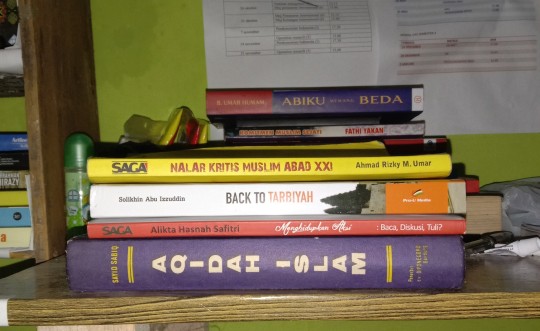
2 notes
·
View notes
Text
#Onthisday, 4 dicembre 1131, notato astronomo, matematico e poeta musulmano, Omar Khayyam, morì a Nishapur (ora in Iran). È noto principalmente come scienziato, in particolare come astronomo e matematico che ha contribuito al calendario Jalali. Mentre è in Occidente, è ampiamente noto per il suo Rubaiyat (quartine).
Omar Khayyam era un eccezionale matematico e astronomo che scrisse diverse opere tra cui problemi di aritmetica, un libro sulla musica e uno sull'algebra prima di avere 25 anni.
Nel 1070, si trasferì a Samarkand e scrisse il suo lavoro di algebra più famoso, trattato sulla dimostrazione di problemi di algebra. Ha anche scoperto un metodo geometrico per risolvere le equazioni cubiche intersecando una parabola con un cerchio.
È stato inviato un invito a Khayyam da Seljuq Sultan Malik Shah e il suo visir Nizam al-Mulk che chiedevano a Khayyam di andare a Esfahan per creare un osservatorio lì. Altri principali astronomi sono stati portati anche all'Osservatorio di Esfahan e per 18 anni Khayyam ha guidato gli scienziati e ha prodotto un lavoro di qualità eccezionale.
Durante questo periodo Khayyam ha guidato il lavoro sulla compilazione di tabelle astronomiche e ha anche contribuito alla riforma del calendario nel 1079. Khayyam ha misurato la durata dell'anno di 365.24219858156 giorni, il che è straordinariamente accurato.
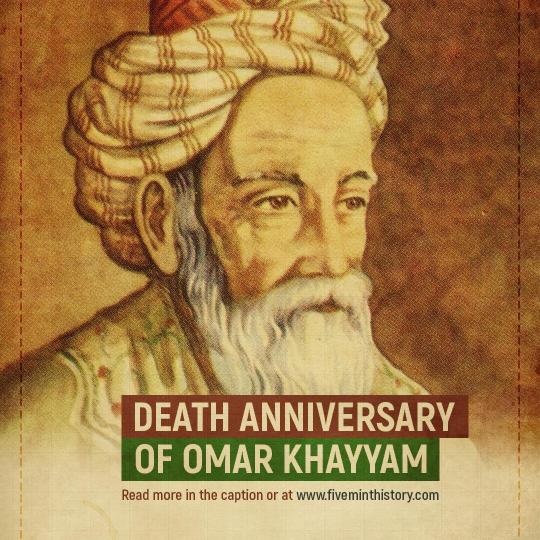
15 notes
·
View notes
Text
𝐃𝐨𝐧'𝐭 𝐎𝐩𝐩𝐫𝐞𝐬𝐬 𝐏𝐞𝐨𝐩𝐥𝐞 𝐛𝐲 𝐑𝐞𝐩𝐨𝐫𝐭𝐢𝐧𝐠 𝐓𝐡𝐞𝐦 𝐭𝐨 𝐎𝐩𝐩𝐫𝐞𝐬𝐬𝐨𝐫𝐬
Ibn ‘Aqil al-Hanbali (d. 513 A.H.) is reported to have said:
رأيت الناس لا يعصمهم من الظلم إلا العجز، ولا أقول العوام، بل العلماء، كانت أيدي الحنابلة مبسوطة في أيام ابن يوسف، فكانوا يستطيلون بالبغي على أصحاب الشافعي في الفروع، حتى منعوهم من الجهر بالبسملة، والقُنوت، وهي مسألة اجتهادية، فلما جاءت أيام النظام، ومات ابن يوسف، وزالت شوكة الحنابلة استطال عليهم أصحاب الشافعي استطالة السلاطين الظلمة، فاستعدَوا بالسجن، وآذَوا العوام بالسعايات، والفقهاء بالنبذ بالتجسيم.
قال: فتدبرت أمر الفريقين، فإذا بهم لم يعمل فيهم آداب العلم…
I have seen that some people were only stopped from oppressing others owing to their incapability [i.e. because of the lack of political support and backing from rulers]. I am not referring to laypeople, but rather scholars. The Hanbalis were the dominant force in the period of Abu Yusuf, and they would tyrannize the Shaf’is in subsidiary legal matters. This was to the extent that they prevented them [i.e. the Shaf’is] from loudly reciting the Basmalah [in Salah], or performing the Qunut [in the Fajr Salah], despite it being an issue open to ijtihad. Then when the period of Nizam [al-Mulk] commenced and Abu Yusuf died, the might of the Hanbalis subsided and the Shafi’is now began to tyrannize them in the manner of oppressive rulers. They arranged for the imprisonment of people, harmed the jurists by hurling against them the charge of anthropomorphism, and hurt members of the common folk by slandering and informing against them.
He [i.e. Ibn ‘Aqil] said: So I reflected on the two camps, and I came to the realization that they were not observing the necessary manners of knowledge...[1]
Ibn Aqil’s words have much relevance today, and particularly in this situation where sectarianism appears to be a driving force for engaging in oppression against one’s theological opponents in order to further their own sect’s cause.
Imam Ahmad would disapprove of reporting people to oppressive rulers. Imam Ahmad stressed that even if the person whom you warn and rebuke for committing a sin does not stop, that you should still not report him to the Sultan out of fear that he will be oppressed by him,[2] even if they are your neighbors who are drinking alcohol, creating a disturbance by playing the lute, etc.[3] Imam Ahmad even forbade testifying on behalf of someone who was insulted or beaten to the Sultan if he feared that the accused will be oppressed.[4]
Ibn Abi Zayd al-Qayrawani (d. 386 A.H.) said:
وقالوا فيمن اعتدي على رجل فقدمه إلى سلطان معتد يعلم أنه إذا قدمه إليه تجاوز في ظلمه وأغرمه مالا يجب له عليه، فقدمه إليه فغرمه مالا ظلما فقد اختلف في تضمينه، فقال كثير من أصحابنا: إنما عليه الأدب وقد أثم فيما فعل.
And concerning a man who transgresses against someone and then he (i.e. the transgressed man] takes him (i.e. the transgressor) to the Sultan knowing they will oppress that individual and financially penalize him and make him pay something that is not required of him. So if he takes him to the Sultan and the man is unjustly fined; there is a difference of opinion regarding his (i.e. the transgressed man) liability......many of our companions (from amongst the Malikis) said that he must be disciplined and that he committed a sin.[5]
He is also reported to have said:
وأما الرجل يأتي إلى السلطان فيخبره بأسماء قومٍ وموضعهم وهو يعلم أن الذي يطلبهم به السلطان ظلمٌ، فينالهم بسبب تعريفه بهم غرمٌ أو عقوبةٌ، فأراه ضامنًا لما غرمهم مع العقوبة الموجعة.
As for a man who goes to the Sultan and gives him names and locations of people, knowing that the Sultan is seeking them for oppression, and then due to the information he provides, they are fined or punished, then I see that he is liable for the financial penalty he made them pay, and he deserves a severe punishment.[6]
𝐅𝐨𝐨𝐭𝐧𝐨𝐭𝐞𝐬
1) Ibn Muflih, “Al-Furu’”, (Beirut: Dar al-Kotob al-‘Ilmiyyah, 2009), part 2, p. 14
2) Al-Bahuti, “Kashshaaf al-Qinaa’ ‘an Matn al-‘Iqnaa’”, (Beirut: Dar al-Kotob al-Ilmiyyah, 2009), vol. 3, p. 37
3) Al-Khallaal, “Al-Amr bil-Ma’ruf wal-Nahy ‘an al-Munkar”, (Beirut: Dar al-Kotob al-Ilmiyyah, 1986), pp. 53-54.
4) Ibn Muflih, “Al-Aadaab al-Shar’iyyah”, (Beirut: Dar al-Kotob al-Ilmiyyah, 1996), vol.1, pp. 151-152
5) Ibn Abi Zayd al-Qayrawani, “An-Nawadir wal-Ziyaadaat”, (Beirut: Dar al-Gharb al-Islami, 1999), vol. 10, p. 372
6) Ibn Yunus, “Al-Jaami’ li-Masaa’il Al-Mudawwanah”, (Umm al-Qura, Dar Al-Fikr, 2013), vol. 18, p. 361
2 notes
·
View notes
Photo
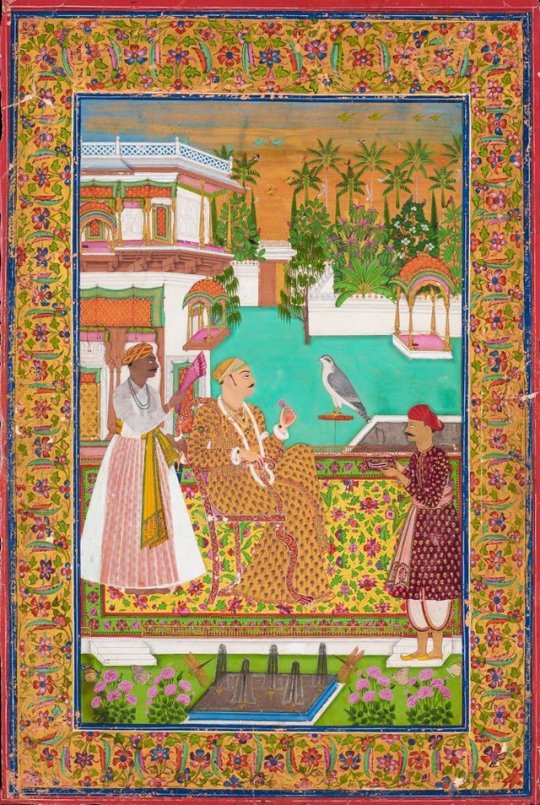
“Ma’ali Mian Saif al-Mulk Being Shown Some Jewels.” . Venkatchellam. Hydbd., 1795. David Colln.
“Ma’ali Mian was the only son of Aristu Jah, prime minister of the Nizam of Hyderabad, Ali Khan Asaf Jah (1761-1803).”
29 notes
·
View notes
Photo
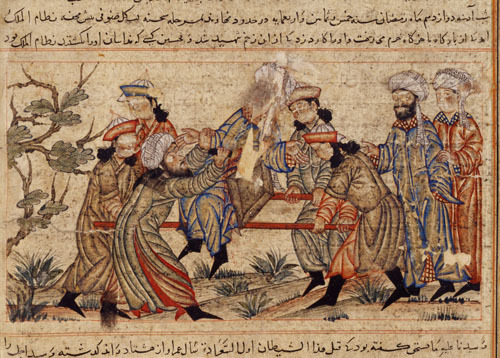
The assassination of Nizam al-Mulk, the ruler of the Seljuk empire, 1092. Though technically only the vizier (advisor to the emperor), he made most of the key decisions for the empire, which during this time expanded quite a bit, taking a large amount of territory from the Byzantine Empire (the threat to Byzantium from the Seljuks was one of the factors that led western Europeans to launch the crusades). Nizam al-Mulk was probably assassinated by one of the Hashishin (Order of Assassins), a Shia sect who fought against the Sunni Seljuks.
122 notes
·
View notes